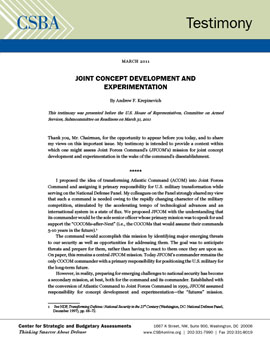
Thank you, Mr. Chairman, for the opportunity to appear before you today, and to share my views on this important issue. My testimony is intended to provide a context within which one might assess Joint Forces Command’s (JFCOM’s) mission for joint concept development and experimentation in the wake of the command’s disestablishment.
I proposed the idea of transforming Atlantic Command (ACOM) into Joint Forces Command and assigning it primary responsibility for U.S. military transformation while serving on the National Defense Panel. My colleagues on the Panel strongly shared my view that such a command is needed owing to the rapidly changing character of the military competition, stimulated by the accelerating tempo of technological advances and an international system in a state of flux. We proposed JFCOM with the understanding that its commander would be the sole senior officer whose primary mission was to speak for and support the “COCOMs-after-Next” (i.e., the COCOMs that would assume their commands 5-10 years in the future).
The command would accomplish this mission by identifying major emerging threats to our security as well as opportunities for addressing them. The goal was to anticipate threats and prepare for them, rather than having to react to them once they are upon us.
On paper, this remains a central JFCOM mission. Today JFCOM’s commander remains the only COCOM commander with a primary responsibility for positioning the U.S. military for the long-term future.
However, in reality, preparing for emerging challenges to national security has become a secondary mission, at best, both for the command and its commander.
Established with the conversion of Atlantic Command to Joint Forces Command in 1999, JFCOM assumed responsibility for concept development and experimentation—the “futures” mission.



























